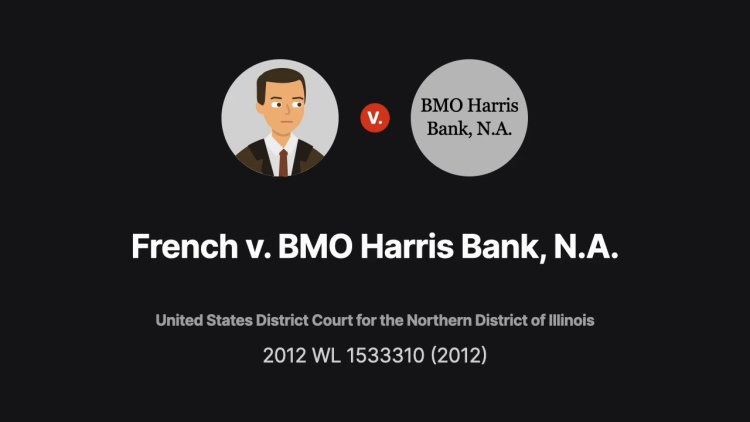French v. BMO Harris Bank, N.A.
United States District Court for the Northern District of Illinois
2012 WL 1533310 (2012)

- Written by Rich Walter, JD
Facts
Ann K. Sobotta defaulted on paying off the mortgage on her residence and the mortgagee, BMO Harris Bank, N.A. (defendant), instituted foreclosure proceedings in state court. The mortgage contained a due-on-sale clause making the mortgagor’s debt due and payable immediately upon the property’s sale or transfer. A few months later, while the foreclosure proceedings were still pending, Sobotta died and title to her property passed to her nephew, Thomas R. French (plaintiff), who was also the executor of Sobotta’s estate. On the estate’s behalf, French filed for bankruptcy under Chapter 13 of the federal bankruptcy code. This had the effect of automatically staying the state-court foreclosure proceedings. French also proposed a plan to restructure the estate’s debt to the bank. The bank objected, on the grounds that 11 U.S.C. § 1322(b)(2) precluded Chapter 13 debt-restructuring for debts secured only by the debtor’s principal residence. The bankruptcy court agreed and lifted the automatic stay. French appealed the bankruptcy court’s action to the federal district court. There, for the first time, French raised the applicability of the Garn-St. Germain Depository Institutions Act of 1982 (Garn-St. Germain Act), 12 U.S.C. § 1701j-3. The Garn-St. Germain Act and its implementing regulations prohibited a mortgage lender from exercising its rights under a due-on-sale clause if the borrower’s property transferred to a relative, and the transfer resulted from the borrower’s death.
Rule of Law
Issue
Holding and Reasoning (St. Eve, J.)
What to do next…
Here's why 907,000 law students have relied on our case briefs:
- Written by law professors and practitioners, not other law students. 47,100 briefs, keyed to 996 casebooks. Top-notch customer support.
- The right amount of information, includes the facts, issues, rule of law, holding and reasoning, and any concurrences and dissents.
- Access in your classes, works on your mobile and tablet. Massive library of related video lessons and high quality multiple-choice questions.
- Easy to use, uniform format for every case brief. Written in plain English, not in legalese. Our briefs summarize and simplify; they don’t just repeat the court’s language.





